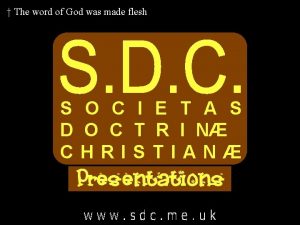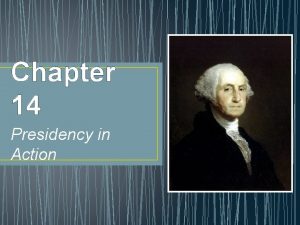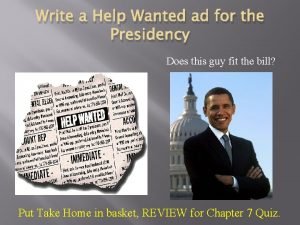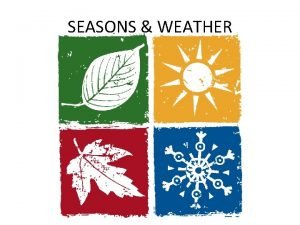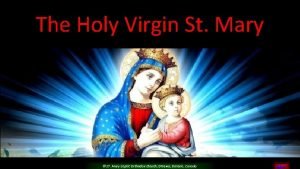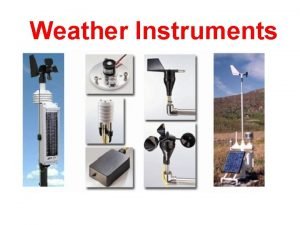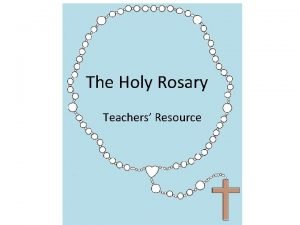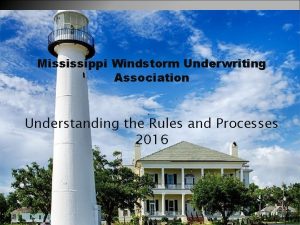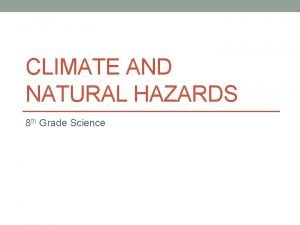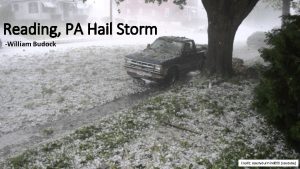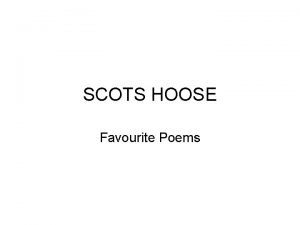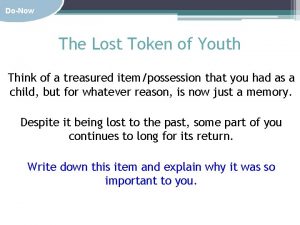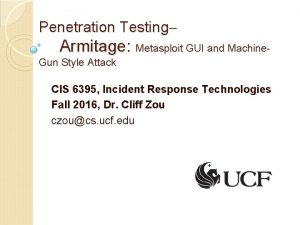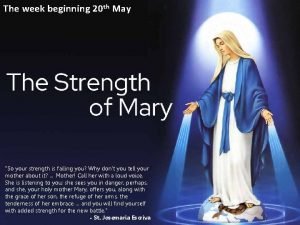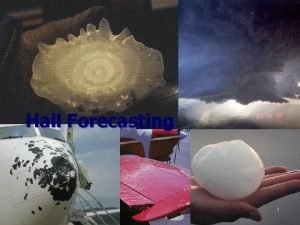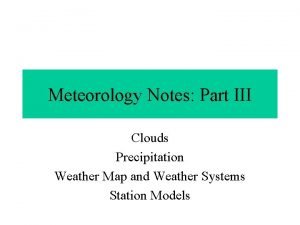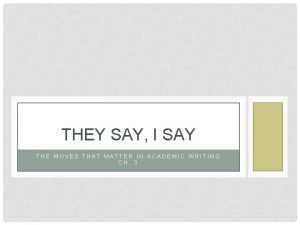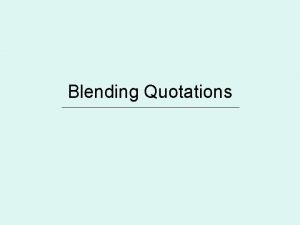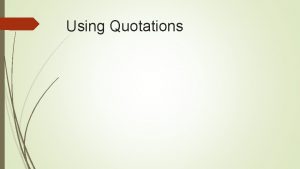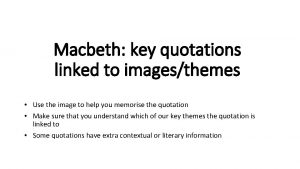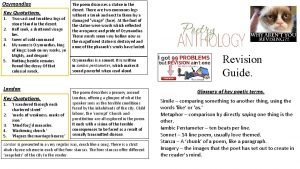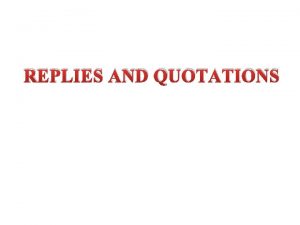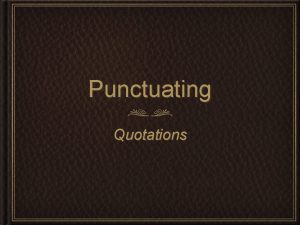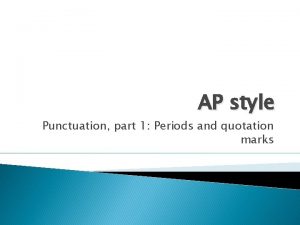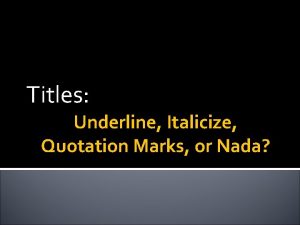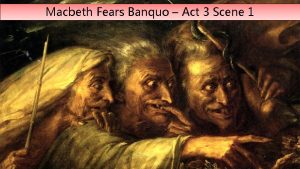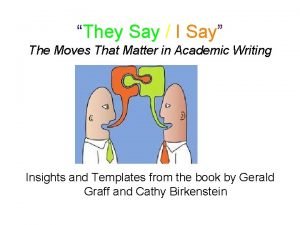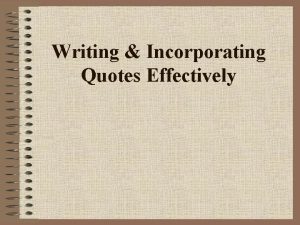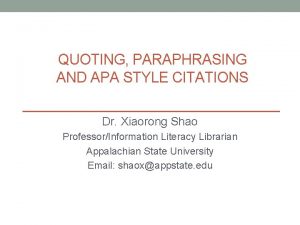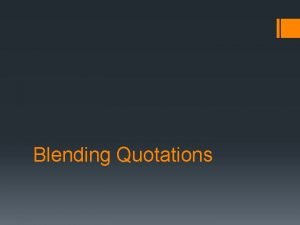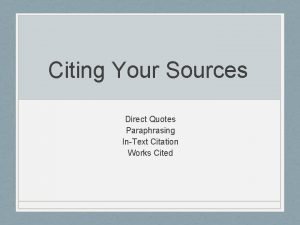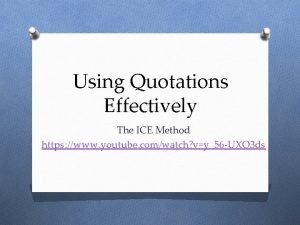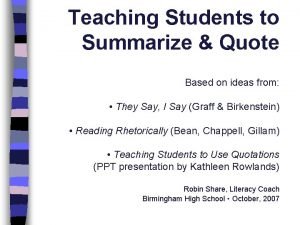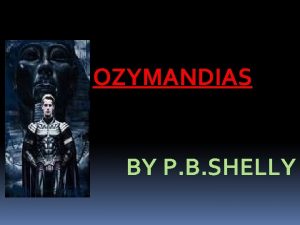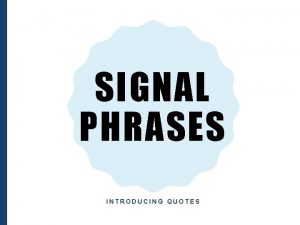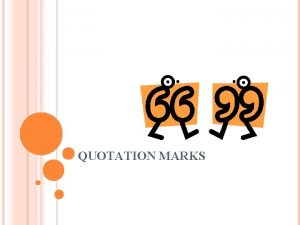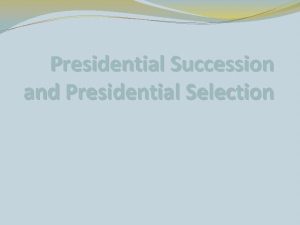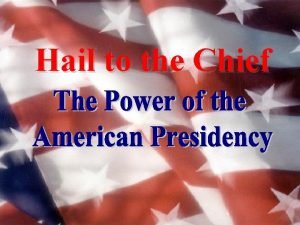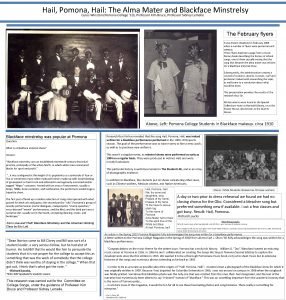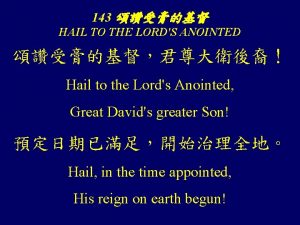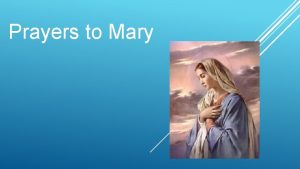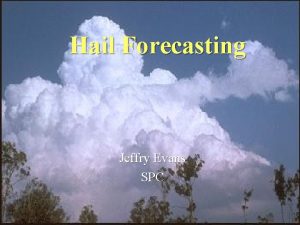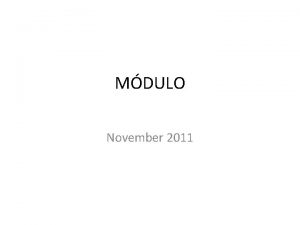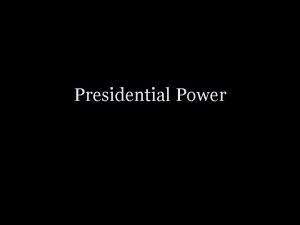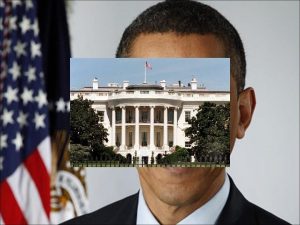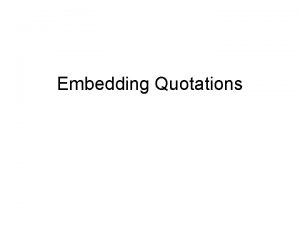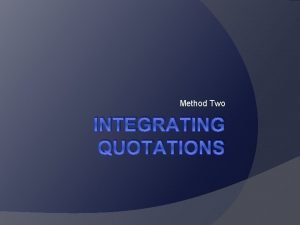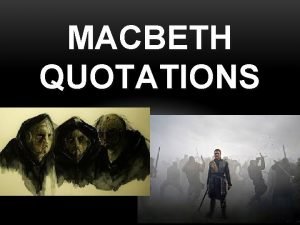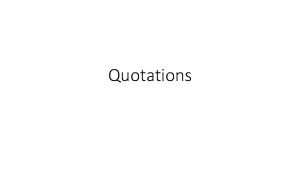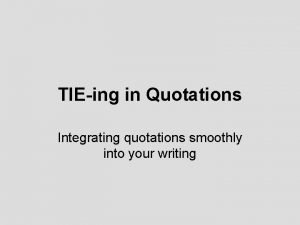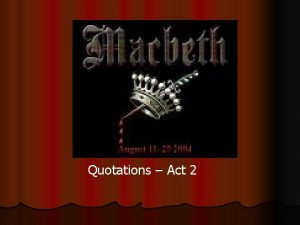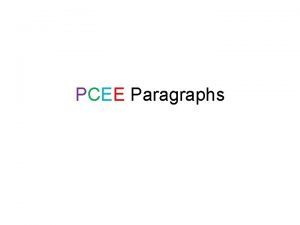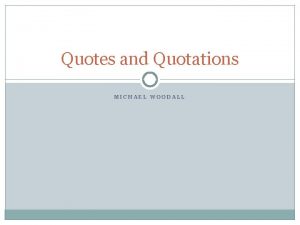Hail to the Chief Presidential Quotations President Harry







































































- Slides: 71

Hail to the Chief

Presidential Quotations

President Harry S. Truman, 33 rd President, 1945 -53 "I sit here all day trying to persuade people to do the things they ought to have the sense to do without my persuading them. That's all the powers of the President amount to. "

President John F. Kennedy “No easy problem ever comes to the President of the United States. If they are easy to solve, somebody else has solved them. ” President Kennedy’s nationally televised address during the Cuban Missile Crisis, October, 1962

President Lyndon B. Johnson “The presidency has made every man who occupied it, no matter how small, bigger than he was; and no matter how big, not big enough for its demands. ” President Johnson, 36 th President, 1963 -69

President Richard M. Nixon "Under the doctrine of the separation of powers, the manner in which the president personally exercises his assigned executive powers is not subject to questioning by another branch of government. " In the aftermath of the Watergate scandal, President Nixon departs the White House after his resignation, Aug. , 1974

President George W. Bush “To those of you who received honors, awards, and distinctions, I say 'Well done. ' And to the C students, I say 'You, too, can be president of the United States. '” President George W. Bush, speaking at Yale University's 300 th commencement ceremony President Bush, 43 rd President, 2001 -present

Chapter 12 Theme A – The Power of the President Theme B – The Institutionalization of the Presidency Theme C – Budget Process…Limits to President’s domestic policymaking

The Modern Imperial Presidency ► What does the term imperial imply? ► What factors contribute to this? § § Crisis = precedents Other branches Public Personality Imperial Presidency is a term that became popular in the 1960 s and that served as the title of a 1973 volume by historian Arthur M. Schlesinger, Jr. to describe the modern presidency of the United States. The author wrote The Imperial Presidency out of two concerns; first that the US Presidency was out of control and second that the Presidency had exceeded the constitutional limits.

Presidential Benefits § $400, 000 tax-free salary § $50, 000/year expense account § $100, 000/year travel expenses § The White House § Secret Service protection § Camp David country estate § Air Force One personal airplane § Staff of 400 -500 Christmas at the White House, 2004

Presidential Powers: According to the Constitution Requirements for Office: must be a natural born citizen at least 35 years of age must have been a resident of the US for 14 years Look at Student Handout 1 and explain this quote: “The President’s powers are broad, and vaguely defined” List the appropriate Constitutional Requirement or Power: 1. George Washington gave first State of the Union Address. (1790) 2. President Clinton appoints former POW Douglas Peterson as the first U. S. Ambassador to Vietnam since the end of the war (1997) 3. President Kennedy negotiates the Nuclear Test Ban Treaty with the USSR (1963) 4. Eisenhower deploys the U. S. National Guard in Little Rock in 1957 to Powers as Commander in Chief: integrate Central High School. Commander in Chief of the Army & Navy Commander in Chief of the state militias (now 5. Washington seeks the advice of Alexander Hamilton and Thomas Jefferson regarding the creation of the first Bank of the United States. the National Guard) (1789) Commission all officers 6. President Ford pardoned Richard Nixon. (1974) Note: importance of civilian power over the 7. President Reagan appoints Sandra Day O’Connor as the first woman military justice of the Supreme Court. (1981) 8. Former California Governor Arnold Schwarzenegger will never be Powers as Chief Executive of the Government: President of the United States. 9. President Obama gives a press conference ensuring Americans that, “faithfully execute” the laws despite its flaws, the Health. Care. gov website will be operational by Jan. require the opinion of heads of executive 1 st for all citizens to register for the mandated Obama. Care health departments grant pardons for federal offenses except for insurance exchange. 10. George W. Bush used recess appointment to appoint John Bolton as cases of impeachment Nominate judges of the Supreme Court and all Ambassador to the United Nations after a prolonged Senate filibuster (2005) other officers of the U. S. with consent of the 11. When reports surfaced that the IRS was using its authority to harass Senate Responsible for all Cabinet Departments and republican organizations, such as the Tea Party, President Obama came under fierce scrutiny and demands were made that appropriate their decisions. disciplinary action be taken. 12. Despite his undeniable charm, charisma, and massive popular Powers in Foreign Affairs: support among the “common folk, ” Mr. Meiser cannot accept his party’s appoint ambassadors, ministers and consuls nomination for Presidential Candidate until 2020 make treaties subject to Senate confirmation 13. George W. Bush issues an invasion of Iraq without a Congressional receive ambassadors Declaration of War. 14. FDR sends to Congress comprehensive legislative agenda known as the New Deal (1933) 15. Truman convenes special session of congress to urge enactment of his domestic agenda 16. Abraham Lincoln ordered a blockade of the South during the Civil War. Legislative Powers: 17. President Clinton submits his budget proposal to Congress, only to Give State of the Union address to Congress have Speaker of the House Newt Gingrich and Congress reject it causing Recommend “measures” to the Congress Upon “extraordinary occasions” convene both a temporary government shutdown. houses of Congress

Presidential Roles

Chief Executive President Clinton with Janet Reno, the first female Attorney General, February, 1993 President Bush holds cabinet meeting in October, 2005

Commander-in-Chief President Johnson decorates a soldier in Vietnam, October, 1966 President Bush aboard U. S. S. Lincoln, May, 2003

Head of State Queen Elizabeth and President Reagan, 1983 President Kennedy speaks at Berlin Wall, 1963

Foreign Policy

Chief Legislator President Clinton delivers the State of the Union Address, 1997 President Roosevelt signs into law the Social Security Act, 1935

Political Party Leader President Reagan & Vice-President Bush accepting their party’s nomination in 1980

Crisis Manager President Bush at Ground Zero after 9 -11 Vice-President Johnson sworn in aboard Air Force One after President Kennedy’s assassination, 1963

Moral Persuader President Lincoln during the Civil War, 1862 President Roosevelt and the “Bully Pulpit, ” 1910

Informal Powers • In the modern era the President’s informal powers may be significantly more powerful than his formal powers • Implied from Executive Power clause “take care laws are faithfully executed”

Executive Orders • Pres. Directive that becomes law w/o cong. Approval • Pertains to existing statues or other Const. responsibilities • Usually to Gov’t agencies and officials • Impact avg. citizen…From the Press office of W. H. – – Truman desegregation of military “Don’t ask don’t tell” Internment of Japanese Americans GWB banning federal funding to planned parenthood-Obama reversing that decision Notice for Japanese “relocation, ” 1942 – Obama’s amnesty to immigrants

Executive Agreements • International agreements, usually related to trade, made by a president that has the force of a treaty; does NOT need Senate approval • Usually an extension of a treaty approved by Senate OR an act already approved by Congress via Joint Resolution. – Jefferson’s purchase of Louisiana in 1803 – GWB announced cuts in the nuclear arsenal – Annexation of territory

Executive Privilege • Claim by a president that he has the right to decide that the national interest will be better served if certain information is withheld from the public, including the Courts and Congress • Used when trying to withhold information or documents from other branches of government (Congressional subpoena) • Relies on Sep. of Powers doctrine & “confidential advice” • United States v. Nixon (1973) – presidents do NOT have unqualified executive privilege

Signing Statements


Cooperative Quiz 1 1. 2. 3.

Making Connections Analyzing Presidential Decisions • Presidential Roles, Formal & Informal Powers: 17 -18 = 20/20 15 -16 = 19/20 13 -14 = 18/20 11 -12 = 17/20 9 -10 = 16/20

The Presidency on Trial Assessing the Limits of Presidential Power

Formal Checks on Presidential Power

Congressional Checks on the President (Article I) Ø Make laws (ex: War Powers Resolution) Ø Override presidential vetoes Ø Power to declare war Ø Power of the purse (taxes and funding) Ø Regulation of the land naval forces Ø Impeachment

Limits on Presidential Power (Article II) Ø President must deliver State of the Union address Ø Senate approves treaties, ambassadors and department appointments Ø “Advice and consent” of federal judge appointments (Senate)

Judicial Checks on the President § Judicial review (Marbury v. Madison) § Chief Justice presides over presidential impeachment trial (Article I)

Constitutional Amendments 20 th – Shortened “Lame Duck” period 22 nd – Presidential term limits (2 terms; 10 years total) 25 th – Presidential disability and succession

Limits on Presidential Power: Informal Checks

Public Opinion In a televised address in March, 1968, President Johnson announced he would not seek the Democratic nomination for president due to sagging public support for his administration and the war in Vietnam. Though he enjoyed record public support during the Persian Gulf War, President George H. W. Bush saw his numbers dip dramatically in the polls and he lost his re-election bid to democrat Bill Clinton in 1992.

The Media

Partisan Politics Howard Dean, Chairman of the Democratic National Committee and vigorous critic of the Bush administration, May, 2005 Speaker of the House Newt Gingrich (R) battles President Bill Clinton (D) over the national budget resulting in the shutdown of the federal government in 1995

Congressional Investigations Senate Banking Committee begins its investigative hearings on the Whitewater scandal during the Clinton administration (1994) Oliver North testifies before Congress at the Iran -Contra hearings during the Reagan administration (1987) Former FEMA director Michael Brown testifies before the House Select Committee on Hurricane Katrina, Sept. , 2002

Interest Groups & NGO’s The National Right to Life Committee and other pro-life interest groups spoke out against President Clinton’s veto of the ban on partial birth abortion, 1996 The National Organization of Women, Cindy Sheehan, and others protest the war in Iraq, April, 2006

Theme A Quiz Part I. Making Connections: In-class Cooperative Application of knowledge 50 pts Ø 15 Formal Checks identified within the 10 examples Ø 14 -15 Formal Checks = 25 pts Ø 13 Formal Checks = 23 pts Ø 11 -12 Formal Checks = 21 pts Ø 10 Formal Checks = 20 pts Ø 16 Informal Checks identified within the 10 examples. (Some examples may not have any informal checks) Ø 15 -16 Informal Checks = 25 pts Ø 14 Informal Checks = 23 pts Ø 12 -13 Informal Checks = 21 pts Ø 11 Informal Checks = 20 pts

Presidential Powers Struggle “Tug of War” ► Adv: Formal Powers such as… ► Disadvantages: 1. Mandatory Spending 2. Party Polarization & Divided Gov’t 3. Lame-Duck Goal…Influence Policymaking Process


Presidential Powers Struggle “Tug of War” Growth of Imperial Presidency A. B. C. D. War Powers (Gulf of Tonkin) Line-Item Veto (Clinton) Executive Privilege (Nixon) Impoundment of Funds (Nixon) Congress/S. C Strikes Back: Power to Say No A. B. C. D. War Powers Act 1973 Clinton v. City of New York US v Nixon 1972 Budget Reform Act

Title: "Bill Clinton's Christmas present from the U. S. House. " Artist: John Pritchett Date: unknown Source: http: //www. pritchettcartoons. com/ gift. htm

Title: “The Madness of King George" Artist: Drew Sheneman, The Newark Star Ledger Date: December, 2005 Source: http: //www. cagle. com/news/Domestic. Spying/1. asp

Theme B The Institutionalization of the Presidency “You get a seat at the table, but the table doesn’t get used. ” Which of the following groups do you think this quote is referring to and why? n n n Vice President White House Staff Cabinet Secretaries National Security Council EOP (Executive Office of the President)

Theme B The Institutionalization of the Presidency n Administration of the White House n n n White House Staff Organizational Structure Administration of the Government n Executive Bureaucracies (pg 382) n n n Cabinet National Security Council EOP (Executive Office of the President)

Executive Institutions and Policy Influences Public Press Congress Government Account Office Senate Committees Armed Services Radio/ Television Congressional Budget Office Cabinet Departments and Agencies House Committees Armed Services Arms Control DOE Agency International Executive Departments Foreign Relations White Interior Domestic Treasury House Council Budget Office President Budget CIA FBI NSC Rules Council Close Advisors of Econ Energy and OMB Science and Advisors National State Technology Justice Resources Office of Science and National Technology Policy Commerce Security Agency Defense Appropriations OSD, JCS, Army Navy, Air Force, DIA Governmental Affairs Governmental Operations Interested Individuals Interest Group

White House Office n President’s closest assistants (West Wing) n Not confirmed by Senate. n Functions: Pg 343 “How Things Work” n Myth: Coordinate Flow of Info n Reality: Development of Policy n “Liaison” for President n Clinton = 500 staff w/ 35. 4 million budget

West Wing Tour

Organization of WHO n 3 Ways Presidents organize their staff n n n Pyramid Structure Circular Structure Ad-Hoc (task forces, committees, informal groups of friends and advisors) Advantages and Disadvantages 1. Look at each diagram. Brainstorm at least 3 advantages and disadvantages of the organization. (Keep in mind the function and purpose of the White House Office) 2. Identify the Pyramid diagram from the Circular diagram 3. Which one appears to be more Practical?

What do you think is the purpose of this meeting? How important is it? How do you know?

The Cabinet n n n Heads of 15 Executive Departments Appointed and Confirmed by Senate Large Bureaucracies n n HHS 100 pol appointees, 65, 000 employees, 11 divisions, 460 b budget Pro’s and Cons

President’s Cabinet 1. How was Washington’s Cabinet different? 2. What role did FDR play concerning the Cabinet? 3. What is the major responsibility of Cabinet officials today? 4. What criteria is used in choosing a Cabinet Secretary? 5. How was President Bush’s cabinet unique? David Greenberg, columnist for Slate magazine.

The usefulness to the president of having cabinet members as political advisers is undermined by the fact that A) the president has little latitude in choosing cabinet members B) cabinet members have little political support independent of the president C) cabinet members are usually drawn from Congress and retain loyalties to Congress D) the loyalties of cabinet members are often divided between loyalty to the president and loyalty to their own executive departments E) the cabinet operates as a collective unit and individual members have limited access to the president

1. All of following help explain the Prez's difficulty controlling cabinet-level agencies EXCEPT A. Agencies often have political support from interest groups B. Agency staff have info, expertise Prez & prez advisers lack C. Prez can fire appointees before they R confirmed by Senate D. Congress is a competitor for influence over the bureaucracy


The Executive Office of the President • Umbrella organization that encompasses support staff for President. • Agencies Report directly to President • Top positions in these Organizations must be confirmed by Senate

Executive Office of the President OMB: Office of Management and Budget (NOT CBO) § Helps Prez w/ Fiscal (NOT Monetary) Policy § Assemble and analyze the figures that go into Pres. Budget § Propose budget cuts for each Cabinet Department and other agencies National Security Council § advise and assist the President on national security and foreign policies. § serves as the President's principal arm for coordinating these policies among various government agencies § members include: NSA, SOS, SOD, HLS, Chairman of JCof. S, CIA director, President and VP

Theme C Presidential Succession Question of the Day? Who is the only person to become both V. P. and President without gaining one vote from the people?

Order of Succession (I) n Constitution President n Vice-President n “Congress may by law provide for the case of the removal, …, both of President and Vice. President, declaring what officer shall then act as President. ” (Article II, Section 1) n n Presidential Succession Acts of: n 1792, 1886, 1947

Order of Succession (II) n Presidential Succession Act of 1947 n n n President (Obama) Vice President (Biden) Speaker of the House President pro tempore of the Senate Cabinet secretaries in order of office creation n State n Treasury n Defense n Attorney General n etc.

Replacing the Vice President & Presidential Disability n n n If the Vice President dies in office who should become his successor? If the Vice President is Impeached, who should become his successor? If the President has a heart attack and is in surgery for 4 hours should he still have Presidential authority? If the President is in a coma should he still have Presidential authority? If the President is suffering from a debilitating disease (Parkinson's, Alzheimer's, MS) should he still have Presidential authority? If the President’s wife is taken hostage, should he still have Presidential authority?

Replacing n There are 2 Parts of the 25 th Amendment Look up the 25 th Amendment. n Fill in the Flow Chart on the following slide that outlines the procedure for: n Removing the President from office

25 th Amendment Scenario A: Willing Scenario B: Unwilling

25 th Amendment Scenario A: Willing Pres. Tells Pres. Pr. Tem. & Speaker he can’t perform his job Scenario B: Unwilling V. P. and maj. of Ex. Officers informs Pres. Pr. Temp & Sp. That Pres is unable to perform his duties Pres. Informs Pr. Te. & Sp. that no inability exist and he resumes power V. P. assumes power w/in 4 days V. P. and maj. of Ex. Officers inform Congress that Pres. is unable to perform duties Pres. Regains power when he is ready Cong. has 21 days to decide. Need 2/3 vote


David Mayhew—Political Scientist studied 267 pieces of legislation between 1946 -1990 *1900 -1952 twenty-two of twenty-six elections created united *1952 -1996 fifteen of twenty two elections created divided claimed that significant legislation would have been passed regardless of who’s in power. Ex. Marshall Plan, 1986 Tax Plan Why? —“Unified” government is somewhat of a myth 1. Differences in constituents and ideology (liberal vs. conservative democrats) 2. Separation of Powers creates a rivalry for power

War Powers ► ► ► ► A. War powers. 1. Constitutional conflict of Congress’ power to declare war vs. the President’s power as Commander in Chief. 2. In the 18 th century, Congress had more time to deliberate war issues; in the modern era, however, Presidents have argued that they need more flexibility to meet rapidly changing conditions. 3. Presidents have sent troops without a congressional declaration of war more than 125 times. This happened very frequently since 1945. 4. Congress has in fact generally gone along with these operations, and has of course funded them, as well. When public opinion turns against the operations, however, Congress has often responded. 5. One of the reasons Congress has gone along with these operations without a formal declaration of war is that such a declaration carries with it the transfer of great emergency powers to the President that Congress may not want to grant. B. Emergency powers: In time of war or emergency, the President assumes great powers.

War Powers Act 1973 ► Passed over Veto ► Restrictions on Presidents ability to use Military force § § § Report in writing 48 hrs after troops sent Need Congressional approval after 60 days W/o approval troops must return ► Impact § Congressional inability
 Hail hail the word made flesh
Hail hail the word made flesh Lesson 3 commander in chief and chief diplomat
Lesson 3 commander in chief and chief diplomat Chapter 14 the presidency in action answer key
Chapter 14 the presidency in action answer key Help wanted ad for president of the united states
Help wanted ad for president of the united states Ducks unlimited checks
Ducks unlimited checks San sebastian weather
San sebastian weather All hail the power of jesus name sda hymnal
All hail the power of jesus name sda hymnal Es'hail 2 transverter
Es'hail 2 transverter Our father prayer hail mary
Our father prayer hail mary Hail to mary coptic
Hail to mary coptic Hail
Hail Measures air temperature
Measures air temperature Air solutions cottonwood
Air solutions cottonwood Glorious mystery
Glorious mystery Mississippi windstorm underwriting association
Mississippi windstorm underwriting association Bill nye weather and climate worksheet
Bill nye weather and climate worksheet Reading pa hail storm
Reading pa hail storm A picture of precipitation
A picture of precipitation Scots hoose poems
Scots hoose poems Oh my jesus prayer
Oh my jesus prayer Hail kenning
Hail kenning The gui for metasploit is given by
The gui for metasploit is given by Hail holy queen prayer
Hail holy queen prayer Hail forecasting
Hail forecasting 11 types of clouds
11 types of clouds Templates for introducing quotations
Templates for introducing quotations Direct and indirect quotation
Direct and indirect quotation Blending in quote
Blending in quote Framing quotes examples
Framing quotes examples Macbeth key quotes
Macbeth key quotes Quotes in ozymandias that show power
Quotes in ozymandias that show power Enquiry email sample for a quotation
Enquiry email sample for a quotation Divided quotation examples
Divided quotation examples Ap style quotations
Ap style quotations Embedding quotations 7
Embedding quotations 7 Underline italicize or quotation marks
Underline italicize or quotation marks Lady macbeth persuasive quotes
Lady macbeth persuasive quotes Daffodils quotations
Daffodils quotations Templates for introducing quotations
Templates for introducing quotations Incorporating quotes
Incorporating quotes Paraphrase citation apa
Paraphrase citation apa Quotations of paraphrases used to support a point
Quotations of paraphrases used to support a point Mla quotation marks and punctuation
Mla quotation marks and punctuation Blending quotations
Blending quotations Do you have to cite when you summarize
Do you have to cite when you summarize Ice writing format
Ice writing format Templates for introducing quotations
Templates for introducing quotations Summary of the poem ozymandias
Summary of the poem ozymandias What is the purpose of a signal phrase
What is the purpose of a signal phrase Quotations with question marks
Quotations with question marks Tỉ lệ cơ thể trẻ em
Tỉ lệ cơ thể trẻ em Lời thề hippocrates
Lời thề hippocrates Vẽ hình chiếu đứng bằng cạnh của vật thể
Vẽ hình chiếu đứng bằng cạnh của vật thể đại từ thay thế
đại từ thay thế Quá trình desamine hóa có thể tạo ra
Quá trình desamine hóa có thể tạo ra Công thức tiính động năng
Công thức tiính động năng Các môn thể thao bắt đầu bằng từ đua
Các môn thể thao bắt đầu bằng từ đua Hát kết hợp bộ gõ cơ thể
Hát kết hợp bộ gõ cơ thể Sự nuôi và dạy con của hươu
Sự nuôi và dạy con của hươu Thế nào là mạng điện lắp đặt kiểu nổi
Thế nào là mạng điện lắp đặt kiểu nổi Dot
Dot Thế nào là sự mỏi cơ
Thế nào là sự mỏi cơ Phản ứng thế ankan
Phản ứng thế ankan Voi kéo gỗ như thế nào
Voi kéo gỗ như thế nào Thiếu nhi thế giới liên hoan
Thiếu nhi thế giới liên hoan điện thế nghỉ
điện thế nghỉ Một số thể thơ truyền thống
Một số thể thơ truyền thống Thế nào là hệ số cao nhất
Thế nào là hệ số cao nhất Trời xanh đây là của chúng ta thể thơ
Trời xanh đây là của chúng ta thể thơ Frameset trong html5
Frameset trong html5 Sơ đồ cơ thể người
Sơ đồ cơ thể người Số nguyên tố là gì
Số nguyên tố là gì
